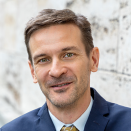Keynote Address by H.E. Nikola Dimitrov, Foreign Minister of the Republic of Macedonia
On September 6, 2017, as Macedonia’s new reform government marked its first hundred days in office, Foreign Minister Nikola Dimitrov visited Berlin. After meeting his German counterpart Sigmar Gabriel, Minister Dimitrov delivered a keynote address at the DGAP, afterward discussing Macedonia’s new foreign policy agenda and ambitions with Kristof Bender, deputy chairman of the think tank European Stability Initiative. DGAP Senior Fellow Milan Nič chaired.
After two years of deep political crisis marked by surveillance and corruption scandals as well as by violent clashes in parliament which left several MPs injured, a new government finally took office in Macedonia* in May 2017. Elected by a slim majority in parliament, it is led by centre-left Social Democrats, includes ethnic Albanian parties, and faces tough opposition from the nationalist VMRO-DPMNE party, which ruled the Balkan country of two million people for the past decade, turning it into a semi-authoritarian state.
According to Foreign Minister Dimitrov, his country has now entered a new, more mature phase, one that places priority on strengthening institutions and setting up independent checks and balances. In foreign policy, his government moved quickly to improve relations with its neighbours and now hopes to revive its stalled bids to integrate with the EU and NATO. The new government Skopje is working hard to maintain enthusiasm and spread it across the region. Minister Dimitrov pointed to the signing in August of an agreement on good neighbourly relations with Bulgaria, as well as to intensified diplomatic engagement with Greece, which blocked his country’s attempts to join NATO and start EU accession talks over a long-running dispute on Macedonia’s official name.*
Minster Dimitrov underscored that his first diplomatic trip as foreign minister was to Athens. This was followed by a visit by his Greek counterpart to Skopje last week. The renewed diplomatic activity has led to a series of confidence-building measures and practical improvements in the areas of economics, transportation, cross-border infrastructure, and bilateral relations, including a cooperation agreement between the countries’ respective d diplomatic academies. In the Q&A session that followed Dimitrov’s DGAP speech, the foreign minister also welcomed Germany’s active engagement in the region through the so-called Berlin Process and noted that his talks with Minister Gabriel also focused on the new “Berlin Plus” strategy.
* The country’s UN membership is registered as The Former Yugoslav Republic of Macedonia. The name of the state, however, is the subject of a long-running dispute between Greek and Macedonian governments. Mediation efforts have continued under the UN’s auspices.
Keynote Address by
H.E. Nikola Dimitrov
Minister of Foreign Affairs of the Republic of Macedonia
Discussant:
Kristof Bender
Deputy Chairman, European Stability Initiative (ESI)
Chair:
Milan Nič
Senior Fellow, Robert Bosch Center for Central and
Eastern Europe, Russia, and Central Asia, DGAP
